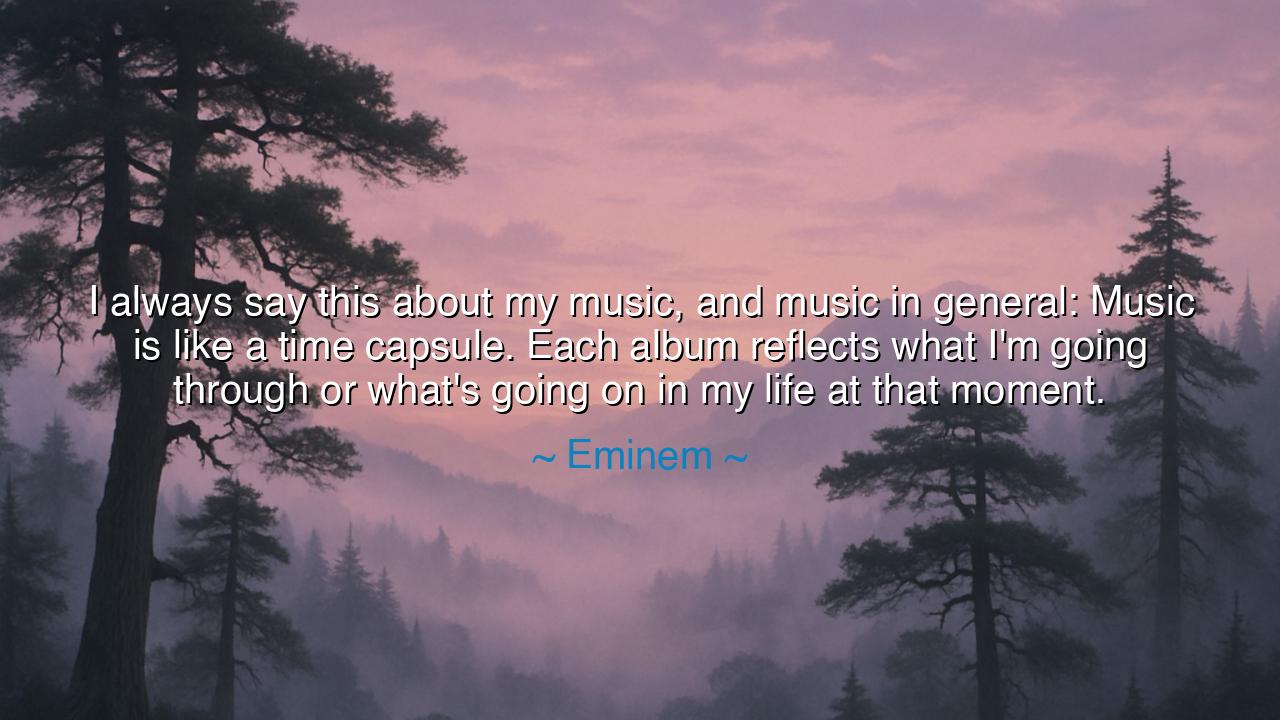
I always say this about my music, and music in general: Music is
I always say this about my music, and music in general: Music is like a time capsule. Each album reflects what I'm going through or what's going on in my life at that moment.






Eminem, a voice forged in hardship and defiance, once proclaimed: “I always say this about my music, and music in general: Music is like a time capsule. Each album reflects what I’m going through or what’s going on in my life at that moment.” In these words, he touches upon a truth both ancient and eternal: that art is not merely entertainment, but a vessel of memory, a record of the soul’s passage through time. Each song, each verse, is not only sound, but testimony. To listen is not only to hear—it is to open a window into another’s moment of being.
The ancients too lived by this law. The poets of Greece recited their epics not as fables, but as living records of their people’s struggles and triumphs. The psalms of Israel carried the cries of joy and despair across generations, preserving the heartbeats of a people through ages of exile and hope. In every culture, music has stood as a time capsule, bearing within it the laughter, the grief, the prayers, and the victories of its makers. Eminem, though born in modern times, speaks with the same wisdom: that an album is not simply a product, but a mirror of the life of its creator.
Consider the story of Bob Dylan during the turbulent 1960s. His songs were not polished ornaments detached from reality; they were chronicles of a world in upheaval. When he sang “The Times They Are A-Changin’,” he was sealing the voices of protest and hope into a time capsule that future generations would open, and by opening, remember. His music was his own reflection, but it became the reflection of millions. So too with Eminem, who has spoken of addiction, rage, struggle, and redemption—his albums are maps of his battles, left behind for others to walk and learn.
The meaning of Eminem’s words is thus layered with power. To say music is a time capsule is to say it preserves what words alone cannot capture. A diary may tell of events, but a song carries the emotion, the rhythm of the heart, the very pulse of a moment. When a listener returns to it years later, it is as if the seal of time is broken, and the past breathes again. Through this, music grants us immortality, for it holds forever what we once felt, feared, and hoped.
The lesson for us is profound: do not dismiss art as mere entertainment. See it as a record, as sacred testimony. The music you make, the words you write, the creations you shape—they are fragments of your life preserved for future eyes and ears. They will speak when you are silent, they will remember when memory fades. To create honestly is to leave behind a time capsule for others to learn from, to be moved by, to grow stronger because of.
Therefore, let each soul practice this art of preservation. Whatever your gift may be, pour into it your truth. Do not wait for perfection, do not polish away the rawness of your moment. Speak of your struggles, your joys, your doubts, your triumphs. For in doing so, you create a mirror of your life that will endure beyond you. And even if the world forgets, your creation will remain, sealed against the erosion of time.
Thus Eminem’s words ring across the ages: “Music is like a time capsule. Each album reflects what I’m going through or what’s going on in my life at that moment.” It is a call to honor art as memory, to see creation as both personal and universal. And for us, it is a reminder that the strongest works are not those crafted to please others, but those born from truth, from the unfiltered rhythm of a life truly lived.






AAdministratorAdministrator
Welcome, honored guests. Please leave a comment, we will respond soon